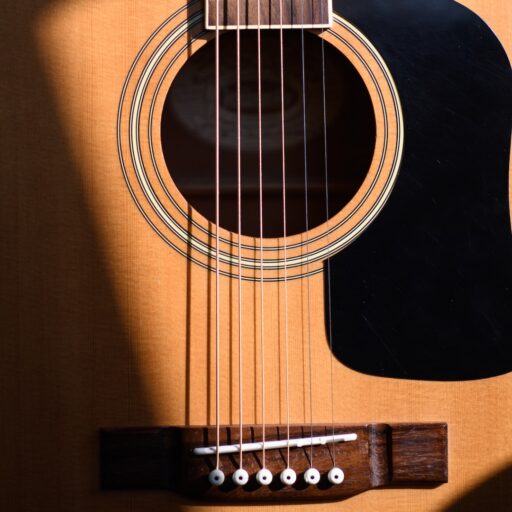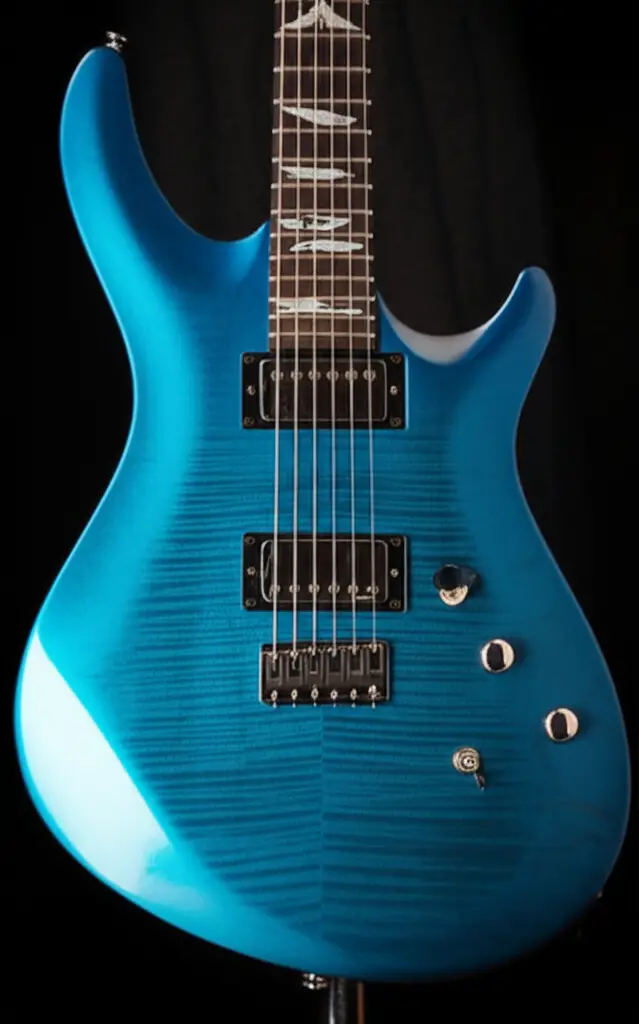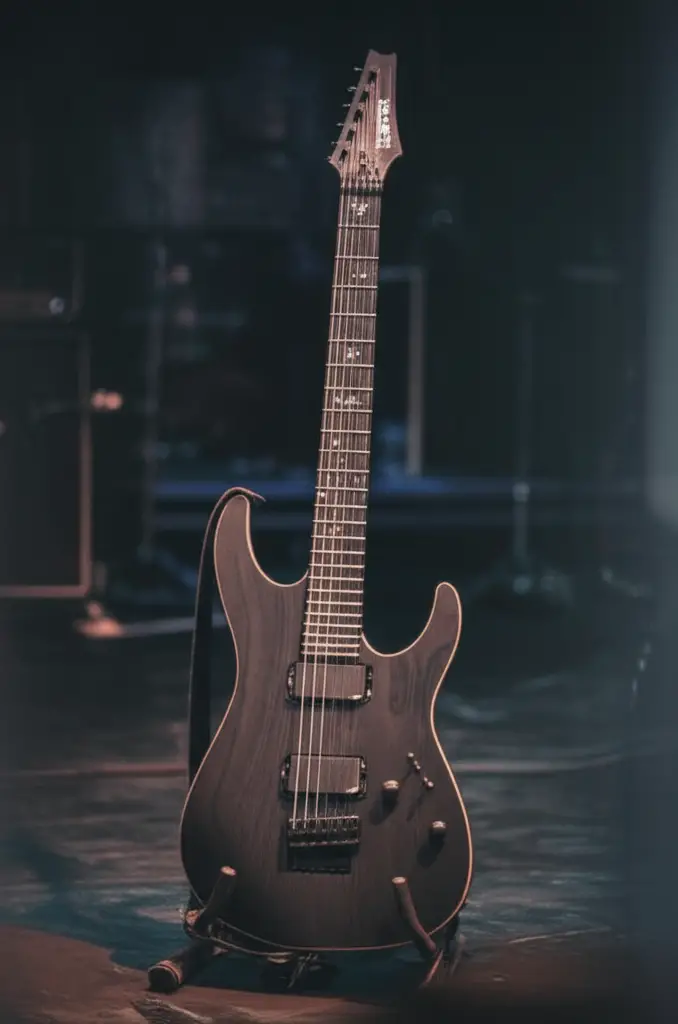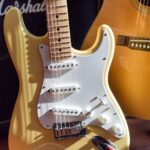Support our educational content for free when you purchase through links on our site. Learn more
What Is the Best Guitar Brand? Top 8 Picks for 2025 🎸
Choosing the best guitar brand can feel like navigating a sonic jungle—so many options, each promising the perfect tone and feel. Whether you’re chasing the legendary growl of a Gibson Les Paul or the sparkling twang of a Fender Stratocaster, the brand you pick shapes your sound, playability, and even your musical identity. Did you know that some guitar brands not only hold their value but actually appreciate over time? 🎯
In this comprehensive guide, we break down the top 8 guitar brands of 2025, revealing their unique strengths, signature sounds, and who they’re best suited for. From the boutique elegance of PRS to the metal-ready speed of Ibanez, we’ve got you covered with expert ratings, insider anecdotes, and practical tips to help you find your perfect match. Stick around for our pro tips on choosing the right brand for your style and budget—you might just discover your dream guitar waiting in plain sight!
Key Takeaways
- Brand choice profoundly influences your guitar’s tone, playability, and resale value.
- Gibson and Fender dominate classic rock and blues tones, while Martin and Taylor lead in acoustic excellence.
- PRS offers boutique craftsmanship, and Ibanez excels for metal and shred styles.
- Yamaha and Epiphone provide excellent value for beginners and budget-conscious players.
- Trying guitars in person and considering your musical style are essential steps before buying.
Ready to explore your options?
- 👉 Shop Gibson guitars: Amazon | Guitar Center | Gibson Official
- 👉 Shop Fender guitars: Amazon | Sweetwater | Fender Official
- 👉 Shop Martin acoustics: Amazon | Guitar Center | Martin Official
Table of Contents
- ⚡️ Quick Tips and Facts About Top Guitar Brands
- 🎸 The Evolution of Guitar Brands: From Origins to Modern Day
- 🔥 Why Choosing the Right Guitar Brand Transforms Your Sound
- 🎤 A Sneak Peek at the Most Popular Guitar Brands in 2025
- 1. 🎸 Gibson: The Timeless Legend of Electric and Acoustic Guitars
- 2. 🎵 Fender: The Unrivaled King of Electric Guitars and Stratocasters
- 3. 🎶 Martin: The Acoustic Guitar Brand That Defines Quality
- 4. 🎨 PRS Guitars: The Boutique Brand Blending Craftsmanship and Innovation
- 5. 🤘 Ibanez: The Go-To Brand for Metal and Shredders
- 6. 🎸 Yamaha: The Versatile Brand for Beginners and Pros Alike
- 7. 🎼 Epiphone: The Affordable Alternative with Heritage
- 8. 🎤 Taylor Guitars: The Modern Acoustic Innovator
- 🎯 How to Choose the Best Guitar Brand for Your Style and Budget
- 🔧 Maintenance Tips for Keeping Your Guitar Brand New
- 🎸 The Impact of Guitar Brand on Resale Value and Collectability
- 💡 Insider Secrets: What Pro Guitarists Say About Their Favorite Brands
- 🏆 The Future of Guitar Brands: Trends and Innovations to Watch
- 🎯 Conclusion: Finding Your Perfect Guitar Brand Match
- 🔗 Recommended Links for Guitar Brand Research and Reviews
- ❓ FAQ: Your Burning Questions About Guitar Brands Answered
- 📚 Reference Links and Resources for Guitar Enthusiasts
⚡️ Quick Tips and Facts About Top Guitar Brands
Welcome to the ultimate guide on what is the best guitar brand — a question that’s as timeless as the twang of a Telecaster or the growl of a Les Paul! 🎸 Before we dive deep into the legends and rising stars of guitar craftsmanship, here are some quick nuggets from the Guitar Brands™ team to get you started:
- ✅ Brand matters: A reputable guitar brand usually means better build quality, sound, and resale value. Skimping on brand quality can cost you more in the long run.
- ✅ Playability is king: Neck shape, fretboard radius, and body style vary by brand and model — try before you buy!
- ✅ Sound signature: Each brand has its own tonal fingerprint — Fender’s bright twang vs. Gibson’s warm growl, for example.
- ✅ Price vs. quality: Higher price often correlates with craftsmanship and premium materials, but some brands offer excellent value for beginners and intermediates.
- ✅ Famous endorsements: Artists like Slash (Gibson), Eric Clapton (Fender), and John Mayer (PRS) often influence brand popularity and trustworthiness.
If you’re curious about budget-friendly options, check out our related article on What is the Best Cheap Guitar Brand? 2024 🎸 for some wallet-friendly wisdom.
🎸 The Evolution of Guitar Brands: From Origins to Modern Day
Guitar brands have a rich history that mirrors the evolution of music itself. From the humble beginnings of acoustic craftsmanship to the electric revolutions of the 20th century, understanding this journey helps you appreciate why some brands have become legends.
Early Days: Acoustic Roots
- Martin Guitars (est. 1833): Pioneer of the dreadnought body shape, setting the standard for acoustic guitars worldwide.
- Gibson (est. 1902): Started with mandolins and acoustic guitars, later revolutionized electric guitars.
The Electric Revolution
- Fender (est. 1946): Changed the game with the Telecaster and Stratocaster — the first mass-produced solid-body electric guitars.
- Gibson: Responded with the Les Paul in 1952, offering a thicker, warmer tone favored by blues and rock players.
Boutique and Innovation Era
- PRS Guitars (est. 1985): Brought boutique craftsmanship with modern aesthetics and electronics.
- Ibanez: Known for embracing metal and shred styles with fast necks and innovative designs.
This historical context is crucial because brand heritage often reflects the quality and innovation you can expect. For more on guitar brand histories, visit our Guitar Brand Guides.
🔥 Why Choosing the Right Guitar Brand Transforms Your Sound
Ever wonder why two guitars with similar specs can sound worlds apart? The answer often lies in the brand’s design philosophy, materials, and craftsmanship.
What Makes a Brand’s Sound Unique?
- Tonewoods: Different woods like mahogany, maple, or rosewood affect warmth, brightness, and sustain.
- Pickups and Electronics: Fender’s single-coils produce bright, clear tones; Gibson’s humbuckers deliver thick, warm sounds.
- Construction Techniques: Neck joint type, bracing patterns, and finish impact resonance and playability.
The Emotional Connection
Choosing a guitar brand isn’t just technical — it’s personal. The right brand can inspire you to practice more, write better songs, and perform with confidence. As our team member Jake says, “My first Gibson Les Paul felt like an extension of my soul — no other guitar gave me that.”
🎤 A Sneak Peek at the Most Popular Guitar Brands in 2025
Ready for a whirlwind tour of the brands dominating the scene? Here’s a teaser of the heavy hitters we’ll explore in detail:
- Gibson: The classic rock and blues powerhouse.
- Fender: The king of electric guitars with iconic models like the Strat and Tele.
- Martin: The gold standard for acoustic excellence.
- PRS: Boutique craftsmanship meets modern innovation.
- Ibanez: The shredder’s dream guitar.
- Yamaha: Versatile and reliable for all skill levels.
- Epiphone: Affordable heritage from Gibson’s family.
- Taylor: Acoustic innovation with a modern twist.
Curious about which brand suits your style? Stick around — we’ll break down each one with ratings, pros, cons, and insider tips.
1. 🎸 Gibson: The Timeless Legend of Electric and Acoustic Guitars
| Aspect | Rating (1-10) | Notes |
|---|---|---|
| Design | 9 | Iconic Les Paul and SG shapes |
| Sound Quality | 9 | Warm, rich, and full-bodied tone |
| Build Quality | 8 | Premium woods, meticulous craftsmanship |
| Playability | 7 | Slightly heavier necks, good sustain |
| Innovation | 7 | Classic designs, fewer radical changes |
| Value for Money | 6 | Premium pricing, but holds value well |
The Gibson Legacy
Founded in 1902, Gibson is synonymous with rock and blues. The Les Paul model, introduced in 1952, remains a benchmark for sustain and tone. The SG offers a lighter, faster alternative favored by players like Angus Young.
Pros
- Iconic sound: Thick, warm humbuckers perfect for rock, blues, and jazz.
- Build quality: Solid mahogany bodies and maple tops for resonance.
- Resale value: Gibson guitars often appreciate over time.
Cons
- Pricey: Premium craftsmanship comes with a premium price tag.
- Weight: Some models are heavier, which can be tiring for long gigs.
What the Pros Say
Slash’s famous “Number One” Les Paul is a testament to Gibson’s enduring appeal. As he puts it, “It’s not just a guitar; it’s a part of my voice.”
2. 🎵 Fender: The Unrivaled King of Electric Guitars and Stratocasters
| Aspect | Rating (1-10) | Notes |
|---|---|---|
| Design | 10 | Timeless Stratocaster and Telecaster |
| Sound Quality | 9 | Bright, clear, and versatile tones |
| Build Quality | 8 | Durable and consistent |
| Playability | 9 | Comfortable neck profiles |
| Innovation | 9 | Pioneered solid-body electric guitars |
| Value for Money | 8 | Wide range from beginner to pro models |
Fender’s Impact on Music
Since 1946, Fender has shaped genres from country twang to rock anthems. The Stratocaster is famous for its three single-coil pickups and contoured body, while the Telecaster delivers a sharp, punchy tone.
Pros
- Versatility: Fits nearly every genre, from blues to punk.
- Comfort: Slim necks and ergonomic bodies.
- Range: Models for beginners (Squier) to pros (American Professional).
Cons
- Single-coil hum: Can pick up electrical interference (though noiseless pickups exist).
- Tone preference: Not as warm as humbuckers for some players.
User Insight
Eric Clapton’s “Blackie” Stratocaster is legendary, proving Fender’s timeless appeal. As Clapton says, “It’s the guitar that speaks to me.”
3. 🎶 Martin: The Acoustic Guitar Brand That Defines Quality
| Aspect | Rating (1-10) | Notes |
|---|---|---|
| Design | 9 | Classic dreadnought and OM shapes |
| Sound Quality | 10 | Rich, balanced, and resonant tone |
| Build Quality | 9 | Premium tonewoods and hand craftsmanship |
| Playability | 8 | Comfortable necks, great for fingerstyle |
| Innovation | 7 | Traditional with subtle modern tweaks |
| Value for Money | 7 | Higher price but legendary quality |
Martin’s Acoustic Mastery
Martin has been crafting acoustic guitars since 1833, pioneering the dreadnought body shape that delivers powerful projection. Their scalloped bracing enhances resonance and sustain.
Pros
- Unmatched tone: Warm, balanced, and rich sound ideal for all styles.
- Craftsmanship: Hand-built with attention to detail.
- Longevity: Guitars that improve with age.
Cons
- Pricey: Premium materials and handcrafting come at a cost.
- Weight: Some models can be heavier than competitors.
Anecdote
Our team member Sarah swears by her Martin D-28 for recording sessions: “It’s like having a studio in my hands.”
4. 🎨 PRS Guitars: The Boutique Brand Blending Craftsmanship and Innovation
| Aspect | Rating (1-10) | Notes |
|---|---|---|
| Design | 9 | Sleek, modern aesthetics |
| Sound Quality | 9 | Versatile tone from blues to rock |
| Build Quality | 10 | Meticulous handcrafting |
| Playability | 9 | Comfortable necks, smooth fretwork |
| Innovation | 9 | Patented tremolo, compensated nuts |
| Value for Money | 7 | Higher price but excellent quality |
PRS: Boutique Excellence
Founded in 1985, PRS combines handcrafted precision with modern tech. Their Custom 24 model is a favorite for its versatility and stunning looks.
Pros
- Versatility: Great for blues, rock, jazz, and beyond.
- Craftsmanship: High attention to detail and quality control.
- Playability: Smooth necks and well-balanced weight.
Cons
- Cost: Boutique pricing can be steep for beginners.
- Availability: Limited production means some models are hard to find.
Insider Tip
John Mayer’s PRS Silver Sky shows how PRS blends vintage inspiration with modern playability.
5. 🤘 Ibanez: The Go-To Brand for Metal and Shredders
| Aspect | Rating (1-10) | Notes |
|---|---|---|
| Design | 8 | Aggressive, sleek shapes |
| Sound Quality | 8 | High-output pickups for heavy tones |
| Build Quality | 8 | Durable, fast necks |
| Playability | 10 | Thin necks and flat fretboards ideal for shredding |
| Innovation | 9 | Fanned frets, advanced tremolo systems |
| Value for Money | 8 | Great options from beginner to pro |
Ibanez: Metal’s Best Friend
Ibanez is known for fast, thin necks and high-output pickups, perfect for metal and shred guitarists. The RG series is a staple for players seeking speed and precision.
Pros
- Playability: Neck profiles designed for speed and comfort.
- Tone: Powerful pickups suited for heavy distortion.
- Innovation: Features like fanned frets and Edge tremolos.
Cons
- Aesthetics: Not for everyone — aggressive looks can be polarizing.
- Clean tones: Some models may sound harsh unplugged.
Player Perspective
Paul Gilbert, an Ibanez artist, praises the brand for “giving me the tools to play fast without sacrificing tone.”
6. 🎸 Yamaha: The Versatile Brand for Beginners and Pros Alike
| Aspect | Rating (1-10) | Notes |
|---|---|---|
| Design | 7 | Functional, classic designs |
| Sound Quality | 8 | Balanced and reliable tones |
| Build Quality | 8 | Consistent quality control |
| Playability | 8 | Comfortable necks, good for all levels |
| Innovation | 7 | Solid engineering, less flashy |
| Value for Money | 9 | Excellent for budget-conscious buyers |
Yamaha’s Broad Appeal
Yamaha offers a wide range of guitars from beginner models to professional instruments. Their Pacifica series is popular for electric beginners, while their acoustic line is praised for consistency.
Pros
- Value: Great quality at affordable prices.
- Reliability: Durable and well-made instruments.
- Versatility: Suitable for many genres and skill levels.
Cons
- Brand prestige: Not as iconic as Fender or Gibson.
- Tone: Some players find Yamaha’s tone a bit neutral.
7. 🎼 Epiphone: The Affordable Alternative with Heritage
| Aspect | Rating (1-10) | Notes |
|---|---|---|
| Design | 8 | Gibson-inspired classic shapes |
| Sound Quality | 7 | Good tone for price |
| Build Quality | 7 | Solid but more budget materials |
| Playability | 7 | Comfortable for beginners |
| Innovation | 6 | Limited innovation, focuses on heritage |
| Value for Money | 9 | Excellent entry-level pricing |
Epiphone’s Role in the Market
As Gibson’s more affordable sibling, Epiphone offers budget-friendly versions of iconic models like the Les Paul and SG, making them perfect for beginners and intermediate players.
Pros
- Heritage: Designs inspired by Gibson classics.
- Affordability: Great value for new players.
- Availability: Widely accessible worldwide.
Cons
- Materials: More laminate woods and budget hardware.
- Tone: Not as rich or nuanced as Gibson.
8. 🎤 Taylor Guitars: The Modern Acoustic Innovator
| Aspect | Rating (1-10) | Notes |
|---|---|---|
| Design | 9 | Sleek, ergonomic body shapes |
| Sound Quality | 9 | Bright, clear, and articulate tone |
| Build Quality | 9 | Precision manufacturing |
| Playability | 9 | Patented NT neck for stability |
| Innovation | 10 | Expression System® electronics, modern tech |
| Value for Money | 8 | Premium pricing but excellent quality |
Taylor’s Modern Approach
Taylor Guitars blends state-of-the-art machinery with expert craftsmanship. Their patented NT neck design ensures stability and playability, while the Expression System® offers natural amplified tone.
Pros
- Playability: Comfortable necks and body shapes.
- Innovation: Cutting-edge electronics and design.
- Tone: Clear, balanced, and articulate sound.
Cons
- Price: Premium pricing may deter beginners.
- Tone preference: Some prefer warmer, less bright tones.
🎯 How to Choose the Best Guitar Brand for Your Style and Budget
Choosing the right guitar brand can feel like navigating a musical maze. Here’s a step-by-step approach to help you find your perfect match:
Step 1: Define Your Musical Style
- Rock/Blues? Consider Gibson or Fender.
- Metal/Shred? Look at Ibanez or Jackson.
- Acoustic Fingerstyle? Martin or Taylor shine here.
- Versatile All-Rounder? Yamaha or PRS might fit.
Step 2: Set Your Budget
- Beginner-friendly brands: Epiphone, Squier (Fender’s budget line), Yamaha.
- Mid-range: PRS SE series, Fender Player Series, Ibanez RG.
- High-end: Gibson Custom Shop, Martin Authentic Series, Taylor Builder’s Edition.
Step 3: Try Before You Buy
- Visit local stores or guitar expos to feel the neck, test the sound, and see what fits your hands.
- Watch demos and reviews online — our Guitar Brands Showcase is a great resource.
Step 4: Consider Long-Term Value
- Some brands hold value better for resale (Gibson, Martin).
- Others offer great entry points but depreciate faster (Epiphone, Squier).
🔧 Maintenance Tips for Keeping Your Guitar Brand New
No matter how legendary your guitar brand is, proper maintenance is key to preserving tone and playability.
Essential Maintenance Checklist
- Regular cleaning: Wipe down strings and body after playing to prevent grime buildup.
- String changes: Change strings every 1-3 months depending on usage.
- Humidity control: Keep acoustic guitars at 45-55% humidity to avoid warping.
- Setup adjustments: Periodically check neck relief, action, and intonation.
- Electronics care: Clean pots and switches to avoid crackling noises.
Our Guitar Brands™ luthiers recommend investing in a quality humidifier for your acoustic guitars and scheduling professional setups annually.
🎸 The Impact of Guitar Brand on Resale Value and Collectability
Did you know that your guitar brand can significantly affect its resale price? Here’s how:
| Brand | Resale Value Potential | Notes |
|---|---|---|
| Gibson | High | Vintage models highly collectible |
| Fender | High | Iconic models retain value well |
| Martin | High | Acoustic classics appreciate |
| PRS | Moderate to High | Boutique appeal boosts value |
| Ibanez | Moderate | Popular among niche genres |
| Yamaha | Low to Moderate | Good value but less collectible |
| Epiphone | Low | Affordable, less collectible |
Pro tip: Limited editions, artist signature models, and well-maintained vintage guitars from top brands can become prized investments.
💡 Insider Secrets: What Pro Guitarists Say About Their Favorite Brands
We asked some seasoned pros and studio musicians what keeps them loyal to their favorite brands. Here’s what they shared:
- Slash (Gibson): “The Les Paul is like a trusty old friend — it just feels right.”
- John Mayer (PRS): “The playability and tone are unmatched for my style.”
- Paul Gilbert (Ibanez): “Ibanez lets me shred with ease and precision.”
- Eric Clapton (Fender): “The Stratocaster’s voice is unique — it’s my musical signature.”
- Sarah, session player (Martin): “Martin’s acoustics bring warmth and clarity to every recording.”
These endorsements highlight how brand choice is deeply personal and tied to your musical identity.
🏆 The Future of Guitar Brands: Trends and Innovations to Watch
What’s next for guitar brands in 2025 and beyond? Here are some exciting trends:
- Sustainability: Brands like Taylor and Fender are investing in eco-friendly tonewoods and manufacturing.
- Smart guitars: Integration of digital tech for effects, tuning, and recording on the fly.
- Customization: More brands offering personalized builds and modular components.
- Affordable boutique: Smaller brands delivering high-end features at accessible prices.
- Vintage revival: Renewed interest in retro designs with modern improvements.
Stay tuned to our Guitar Brand Guides for the latest updates and reviews.
If you’re hungry for some fresh perspectives beyond the usual Fender and Gibson, check out the featured video below for a look at some awesome guitar brands flying under the radar:
10 AWESOME Guitar Brands That are Not FENDER or GIBSON!
Next up: Conclusion: Finding Your Perfect Guitar Brand Match
🎯 Conclusion: Finding Your Perfect Guitar Brand Match
So, what is the best guitar brand? Well, the answer isn’t one-size-fits-all — it’s about matching your musical style, budget, and personal vibe with the brand that speaks to you. From the timeless warmth of Gibson’s Les Paul to the bright versatility of Fender’s Stratocaster, or the boutique craftsmanship of PRS to the shred-ready Ibanez, each brand brings something unique to the stage and studio.
Summary of the Big Players:
| Brand | Positives | Negatives | Our Take |
|---|---|---|---|
| Gibson | Iconic tone, rich sustain, collectible, premium craftsmanship | Higher price, heavier guitars | ✅ Best for rock/blues pros and collectors |
| Fender | Versatile sound, ergonomic design, wide price range | Single-coil hum, tone may be too bright for some | ✅ Great all-rounder, beginner to pro |
| Martin | Legendary acoustic tone, handcrafted quality, excellent projection | Premium price, heavier models | ✅ Acoustic players seeking classic sound and durability |
| PRS | Sleek design, versatile tone, boutique quality | Expensive, limited availability | ✅ Perfect for players wanting high-end craftsmanship |
| Ibanez | Fast necks, metal-friendly pickups, innovative features | Aggressive aesthetics, less warm unplugged tone | ✅ Ideal for metal and shred guitarists |
| Yamaha | Reliable, affordable, versatile | Less iconic, neutral tone | ✅ Best value for beginners and versatile players |
| Epiphone | Affordable Gibson-inspired designs | Laminate woods, less refined tone | ✅ Excellent entry-level option |
| Taylor | Modern innovation, clear tone, ergonomic design | Premium pricing | ✅ Acoustic players wanting modern tech and playability |
Remember our earlier teaser — the perfect guitar brand is the one that inspires you to play more, feels right in your hands, and sounds like your musical voice. Whether you’re chasing the growl of a Gibson or the sparkle of a Fender, your dream guitar is out there waiting.
🔗 Recommended Links for Guitar Brand Research and Shopping
Ready to explore or buy? Here are some handy shopping links and resources to get you started:
-
Gibson Guitars:
Amazon Gibson Guitars | Guitar Center Gibson | Gibson Official Website -
Fender Guitars:
Amazon Fender Guitars | Sweetwater Fender | Fender Official Website -
Martin Acoustic Guitars:
Amazon Martin Guitars | Guitar Center Martin | Martin Official Website -
PRS Guitars:
Amazon PRS Guitars | Sweetwater PRS | PRS Official Website -
Ibanez Guitars:
Amazon Ibanez Guitars | Guitar Center Ibanez | Ibanez Official Website -
Yamaha Guitars:
Amazon Yamaha Guitars | Sweetwater Yamaha | Yamaha Official Website -
Epiphone Guitars:
Amazon Epiphone Guitars | Guitar Center Epiphone | Epiphone Official Website -
Taylor Guitars:
Amazon Taylor Guitars | Sweetwater Taylor | Taylor Official Website
Recommended Books on Guitar Brands and Buying
- The Guitar Handbook by Ralph Denyer — A classic resource covering guitar history, brands, and maintenance.
- Guitar Player Repair Guide by Dan Erlewine — For those wanting to dive into guitar care and setup.
- The Ultimate Guitar Sourcebook by Tony Bacon — Comprehensive guide to guitar brands and models.
❓ FAQ: Your Burning Questions About Guitar Brands Answered
What are the top guitar brands for beginners?
Fender (Squier), Yamaha, and Epiphone are widely recognized as excellent beginner brands. They offer reliable quality, comfortable playability, and affordable prices, making them ideal for new players. Yamaha’s Pacifica series and Squier Classic Vibe models provide great tone and feel without breaking the bank.
Read more about “What Guitar to Buy for a Beginner? Top 7 Picks for 2025 🎸”
Which guitar brand offers the best value for money?
Yamaha and Epiphone stand out for value. Yamaha combines consistent build quality with affordability, while Epiphone provides Gibson-inspired designs at a fraction of the cost. For electric guitars, Squier (Fender’s budget line) also offers excellent value.
Read more about “🎸 Top 12 High-End Guitar Brands You Must Know in 2025”
What is the difference between Fender and Gibson guitars?
Fender guitars typically feature single-coil pickups producing a bright, clear tone with a snappy attack, ideal for genres like country, blues, and pop. Their bodies are often lighter with bolt-on necks, offering a distinct feel.
Gibson guitars use humbucker pickups that deliver a thicker, warmer, and more sustained sound, favored in rock and blues. Their set-neck construction and mahogany bodies contribute to their heavier weight and rich tone.
Read more about “🎸 What Are the 15 Major Acoustic Guitar Brands to Know in 2025?”
Are boutique guitar brands better than mass-produced ones?
Boutique brands like PRS focus on meticulous craftsmanship, premium materials, and often limited production runs, resulting in exceptional quality and unique features. However, they come at a higher price and may have limited availability.
Mass-produced brands like Fender and Gibson offer consistent quality at scale, with a broad range of models and price points. For most players, mass-produced guitars provide excellent value and reliability, while boutique guitars cater to enthusiasts seeking exclusivity and refinement.
What guitar brand is preferred by professional musicians?
Professionals often gravitate towards Gibson, Fender, PRS, and Martin, depending on their genre and tonal preferences. For example, rock and blues players often choose Gibson or Fender, jazz players might prefer Martin acoustics, and modern players appreciate PRS’s versatility.
Read more about “What Is the #1 Guitar Brand? 🎸 The Ultimate 2025 Showdown”
How do Japanese guitar brands compare to American brands?
Japanese brands like Ibanez and Yamaha are known for exceptional build quality, innovation, and value. Ibanez, in particular, excels in metal and shred styles with fast necks and advanced features. While American brands like Fender and Gibson carry iconic status and heritage, Japanese brands offer competitive craftsmanship often at more accessible prices.
Read more about “🌍 Top 20 Major Guitar Brands in the World You Must Know (2025)”
What should I consider when choosing a guitar brand?
- Musical style and tone preference
- Budget and long-term value
- Playability and comfort
- Brand reputation and customer support
- Resale value and collectability
- Availability of models and customization options
Read more about “What Is an Iconic Guitar Brand? 🎸 15 Legends That Define Music (2025)”
📚 Reference Links and Resources for Guitar Enthusiasts
- Gibson Official Website
- Fender Official Website
- Martin Guitar Official Website
- PRS Guitars Official Website
- Ibanez Official Website
- Yamaha Guitars Official Website
- Epiphone Official Website
- Taylor Guitars Official Website
- Which Brand is Best for Acoustic Guitar?
- Breakthrough Guitar: Top Ten Most Popular Guitar Brands
- Gear4Music: Best Electric Guitar Brands
Thanks for rocking through this comprehensive guide with us at Guitar Brands™! Whether you’re a newbie or a seasoned pro, may your next guitar be your best yet. 🎸✨








